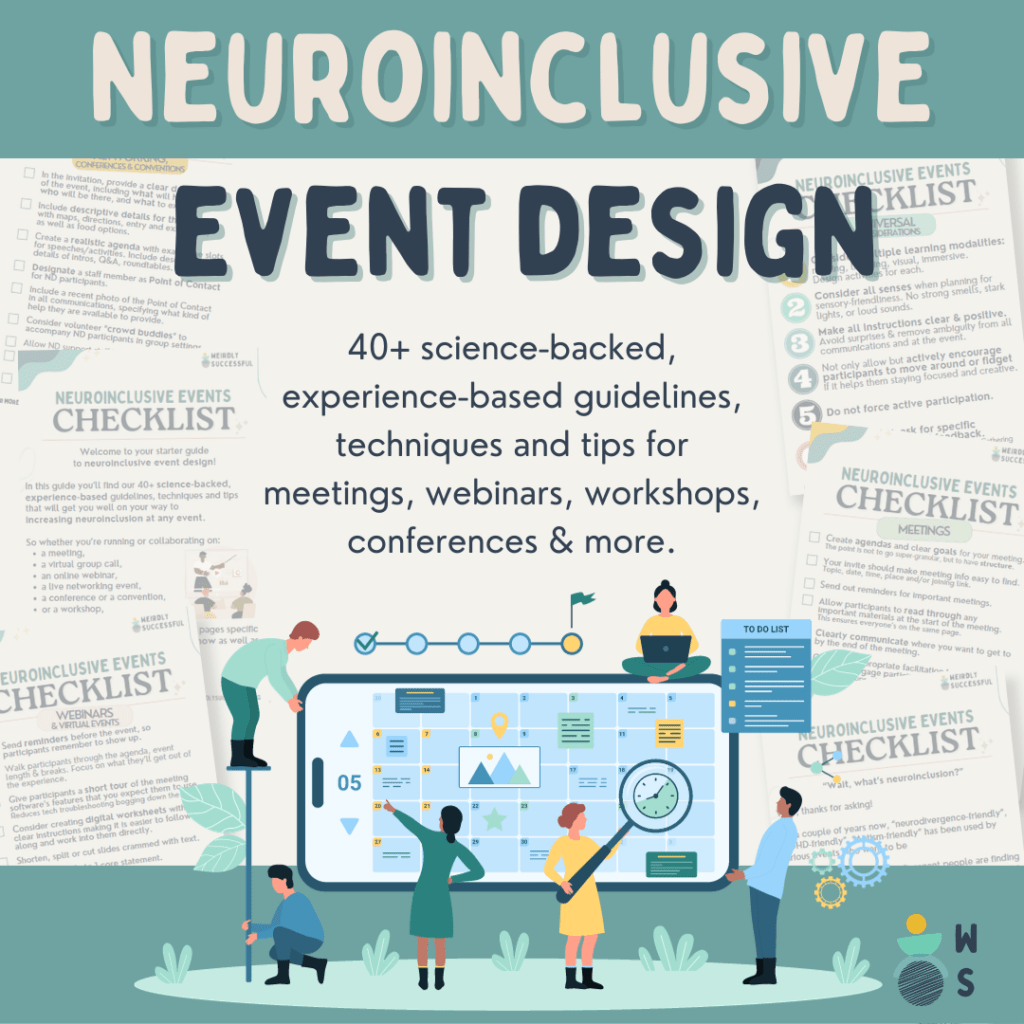Stimming (also known as self-stimulating) is a common sensory-seeking neurodivergent behaviour. It means stimulating yourself in a repetitive manner to self-soothe, regulate, or express excitement. Stimming is common both in ADHD and autism.
Everybody stims

Stimming movements, however, are common in all human beings. Everybody stims, even neurotypical people. Whether it’s chewing the end of a pencil while you think, squealing when seeing a cute puppy, swaying back and forth to the rhythm of the music while you’re standing in line, or swinging your legs when they can’t touch the ground.
Skin picking or nail biting when anxious, humming or singing to yourself not to fall asleep are all forms of stimming.
Like with so many other neurodivergent traits, what is neurodivergent about stimming is not the presence but the frequency and intensity.
Neurodivergent stimming
Neurodivergent stimming is common during a person’s day.
- Stimming usually happens in response to excitement, happiness, boredom, stress, fear, or anxiety.
- It also helps with focus and regulating emotions, giving relief and joy.
- It can also give a sense of control in stressful situations, as the sensation is familiar and comforting: you know what to expect when you do the stim.
- Increased stimming also could be a sign of overwhelm.
Stimming is one of the most beautiful expressions of autistic joy. Autistic actress and activist Chloe Hayden shared a video of how excited she was when she saw whales in the ocean. It is truly heartwarming and wholesome, and there is no harm in letting people freely jump up and down or flap their hands from the sheer joy they’re experiencing.
Some examples of stimming behaviours
- Repetitive movements and noises: rocking back and forth, clicking with a pen, tapping with your foot, slinging or spinning in your chair, clicking with your fingers, humming and grunting, squealing and giggling.
- Small and big stims: Some are big movements (flapping your hands, spinning, jumping up and down), and some can be tiny and less noticeable (doodling, twirling your hair, wiggling your toes in your shoes).
- Stimming with objects: Fidget toys or fidget-like hobbies (puzzles, doodling, cross stitch, crochet, video games) are also fun ways to stim.
- Bodily stims: Some stimming can cause scars or infections, like picking or scratching the skin, hitting objects, biting nails or chewing on the inside of your mouth, so it’s important to figure out what causes the need for that type of stimming and find less harmful alternatives. This type of stimming is not considered self-harm, as it stems from a different need.
Is stimming the same as tics?
No. Tics are involuntary movements that can affect one or more muscles producing simple or complex movements and are one of the traits of Tourette’s Syndrome. 1
Should stimming be stopped?
No, stimming should not be stopped.
Everybody stims, and it is a normal human behaviour, whether it’s part of our self-expression or a coping mechanism.
Stims have a healthy place in our lives and their existence alone is not cause for alarm, and no kind of intervention is needed unless it hurts us or others (like skin picking or nail biting, as seen above).
Curbing infection- and injury-inducing stims should always include helpful, affirming and empathetic approaches and finding the origin of the stim instead of simply punishing the behaviour.
Autistic adults highlighted the importance of stimming as an adaptive mechanism that helps them to soothe or communicate intense emotions or thoughts and thus objected to treatment that aims to eliminate the behaviour.
Kapp, S., Steward, R., Crane, L., Elliott, D., Elphick, C., Pellicano, E., & Russell, G. (2019). ‘People should be allowed to do what they like’: Autistic adults’ views and experiences of stimming. Autism.
Related terms
neuroaffirming
Neuroaffirming or neuro-affirmative refers to practices, approaches, or environments that recognize and affirm the neurodiversity of society and the neurodivergence of individuals.
sensory overwhelm
Learn more about neuroinclusive event design
Grab our Neuroinclusive Events Checklist – a handy and hyper-condensed guide full of zero- to low-cost tips and techniques for webinars, meetings, networking events and workshops.
Download now from The Library, our free resource hub.




